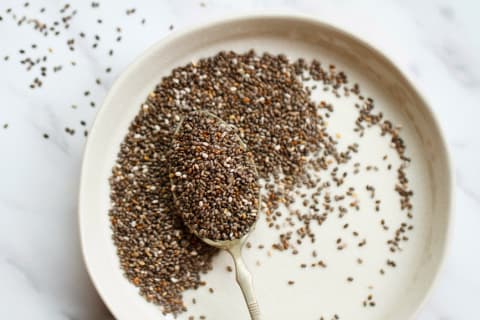Advertisement
The Supplements I Recommend To All My Plant-Based Patients

After 40 years of choosing a plant-based diet and 30 years of advising patients to do the same, I still get concerned when I see vegans eating a poor diet, as there are a variety of foods that carry the vegan label but are unlikely to promote health. For example, both Taco Bell and White Castle are promoting plant-based options. And while this may work in a pinch, the mainstay of a health-promoting eating pattern needs to be whole foods with single ingredients, focusing on nonprocessed staples like fruits, vegetables, legumes, whole grains, nuts, and seeds.
Beyond highly processed junk food, another trap some vegans fall into is ignoring the need to supplement intelligently. This is not a limitation of the vegan diet but represents the state of the world with depleted soil and indoor lifestyles resulting in uniformly low vitamin intake. Most of the adults I seen in the clinic, whether their diet is vegan or otherwise, lack important nutrients that show up on the advanced testing I perform. The following list is what I add to my plant-based diet to maximize results (hint: The first three are the most important).
1. Vitamin B12:
Vitamin B12 is important in brain, nerve, and hematologic health and is a factor in a key process called methylation. Methylation regulates homocysteine levels and plays an important role in the control of DNA regulation. Neither plants nor animals make B12; it's produced by bacteria that reside in the gastrointestinal tract of animals other than humans. When animal products are eaten, B12 is ingested as a bystander. When we wash our produce, we wash off the B12-rich bacteria.
By some estimates, 50 percent of vegans and 10 percent of vegetarians are deficient in vitamin B12. I recommend taking about 2,500 ug once a week, ideally as a liquid, sublingual, or chewable form for better absorption or 250 ug daily if that schedule works better for you. There is no known risk to taking larger amounts of B12.
2. Vitamin D:
Vitamin D is known to promote bone health and is proving to be essential in blood pressure and blood glucose control, in heart function, and in brain health. Measurements of blood levels are the best way to assess adequate amounts of vitamin D. In a study of over 65,000 residents of England, researchers found that vegans had higher levels of fiber, magnesium, and vitamins E and C compared to their carnivorous counterparts but had lower levels of vitamin D.
Direct sunshine on exposed skin for 20 to 30 minutes a day can provide adequate vitamin D, but, for many of us, oral supplementation is necessary. Vitamin D3 is the form most commonly recommended but is usually derived from animal sources such as lanolin. There are vegan versions of D3 now available and the standard recommendation is to supplement with 800 IU a day, but I start routinely with 2,000 IU a day and titrate up to reach blood levels of 50 to 70 ng/mL.
3. Omega-3s:

I can check blood levels for low omega-3 in my clinic and deficiencies are common regardless of diet. However, as fish isn't an option for vegans, I often recommend supplementing with omega-3 in the form of a combined DHA and EPA (the fatty acids that are great for heart and brain health) supplement sourced from algae. I suggest that most patients on a vegan diet take 250 mg each day and at the same time limit foods rich in omega-6, which may contribute to inflammation. These are mainly in the forms of oils such as corn, soy, safflower, sunflower, and vegetable oil blends. Overall, go easy or skip oils for cooking. Finally, adding whole foods rich in ALA, the precursor to EPA and DHA, is encouraged. This is easy using 1 to 2 tablespoons a day of ground flaxseeds, a small handful of English walnuts, chia seeds, and leafy greens.
4. L-carnitine:
L-carnitine plays an important role in shuttling fatty acids across membranes to fuel the production of energy in the heart and other muscles. L-carnitine is found mainly in meat (think carne) and vegetarians have lower levels of L-carnitine in their muscles. There are rare reports of heart disease in patients lacking this amino acid. Although long-term studies of L-carnitine supplementation in vegans are not available, I consider supplementing vegans with 500 mg a day as a recommendation for optimal health—particularly in those who are athletic or who have heart disease. Recently, L-carnitine in red meat has been shown1 to be capable of leading to the creation of TMAO, a molecule I measure in the blood of patients, and that is unfavorable for artery health. I advise patients eating meat, and those taking L-carnitine supplements, to stop both habits if the level of TMAO1 is elevated.
5. Taurine:
Taurine is the most abundant amino acid in the body, and you've probably never heard of it beyond the world of energy drinks. Taurine is important for proper functioning of cardiac immune systems, insulin action, hearing, and electrolyte balance. It is typically found in meat and seafood. Vegans can have low levels of taurine. Supplementation with 500 mg a day is an option.
6. Vitamin K2:
Vitamin K2 directs calcium to bones rather than arteries and has been shown to work well when combined with vitamin D to promote strong bones and a healthy heart. It is difficult to find in plant foods. Our bodies can convert the vitamin K1 found in dark leafy greens to K2, but it is uncertain how much is being converted, and measuring blood levels is not routine. As our bodies age, there is a reduction in vitamin K2 production2, so it is recommended that adult vegans supplement. This vitamin can be found in foods such as sauerkraut, plant-based kefir, unpasteurized kombucha, vegan kimchi, and natto. There are a number of vegan supplements available providing 50 to 100 ug of vitamin K2 a day, usually from natto.
Vegan diets are an amazing choice for health, promoting a clean planet and being mindful of the life of animals farmed for human consumption. Moving to a vegan diet is not only supported by thousands of medical research studies, but it is also endorsed by the United Nations, Oxford University, the USDA Food Guidelines, and the Association of Nutrition and Dietitians3. Although it may seem a bit of a hassle to add these six supplements to your plant-based routine, it's important to be a "smart vegan" and make sure you're giving your body everything it needs to function optimally.

Dr. Joel Kahn is the founder of the Kahn Center for Cardiac Longevity. He is a summa cum laude graduate of the University of Michigan School of Medicine and is a professor of medicine at Wayne State University School of Medicine. He is owner of GreenSpace Cafe in Ferndale, Michigan. His books, The Whole Heart Solution, Dead Execs Don't Get Bonuses, and Vegan Sex are all available for sale now.
More from the author:
Functional Nutrition Training
Check out Functional Nutrition Coaching
A cutting-edge nutrition deep dive taught by 20+ top health & wellness experts
Learn moreMore from the author:
Functional Nutrition Training
Check out Functional Nutrition Coaching
A cutting-edge nutrition deep dive taught by 20+ top health & wellness experts
Learn more
Dr. Joel Kahn is the founder of the Kahn Center for Cardiac Longevity. He is a summa cum laude graduate of the University of Michigan School of Medicine and is a professor of medicine at Wayne State University School of Medicine. He is owner of GreenSpace Cafe in Ferndale, Michigan. His books, The Whole Heart Solution, Dead Execs Don't Get Bonuses, and Vegan Sex are all available for sale now.